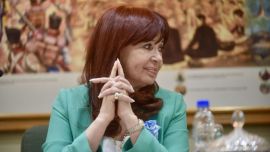Sergio Massa had a month and a half of peace in his relationship with Cristina Fernández de Kirchner. It was a time in which Argentina’s vice-president let him do what he wanted, and the period ran from the moment he took office as economy minister until she made her first objection about the Tigre leader’s performance.
On September 29, the day on which Massa had gone to Congress to render accounts and had engaged in good dialogue with the opposition, Cristina marked the field for him. She asked for a "more precise and effective intervention" on inflation.
Top government officials, who had welcomed the economy minister's intervention in Congress, were offended by the message. "We can't do it this way," they protested (off the record) to journalists who quizzed them about it.
The good news, it seems, was short-lived: suddenly the headlines across the media had changed to the vice-president's demand. It was the end of the truce.
From that moment on, Massa has had to juggle economic issues, just as his predecessors had done. The recipe is complicated: complying with Kristalina Georgieva’s demands and the International Monetary Fund's programme without offending the Kirchnerite sector of the ruling coalition.
In short, going from Cristina to Kristalina – without appearing schizophrenic.
Tension
The lines of communication between the economy minister and Kirchnerite hard-liners remain open. Massa has a direct line to Máximo Kirchner that he uses to bring their positions closer every time the vice-president's son crosses him publicly – an occurrence which happens more and more often. They usually talk at least twice a week.
On October 17, Peronist Loyalty Day, Máximo called for a lump sum bonus payment for all workers, declaring: "They are waiting for you to stop betraying them." In the corridors of the Economy Ministry, the statement came as a surprise. Officials know that they have no margin left to please Kirchnerism, because that would mean failing to comply with the agreement not to increase the fiscal deficit they have with the IMF. Once again, the person in charge at the Economy Ministry has been put between a rock and a hard place.
However, Massa's entourage does not take a dim view of Máximo's public criticism. In fact, it serves their purposes: it allows them to differentiate themselves from Cristina, which will be key for the coming electoral year. In that way, they say, distance is achieved without the Frente Renovador being the one who has to bear the political cost.
Agreements
But it's not all bad news for the Kirchnerites. In recent weeks, Massa has bent to Cristina's pressures and launched plans that deliver some peace of mind – the freezing of prices, raising the income-tax floor, the delay in the implementation of the segmentation of tariffs, a bonus payment for people without income and the most marketing-oriented of all the policies: an instalment plan option to help people buy new televisions before the World Cup kicks off.
With characteristic political restraint, Massa presents one by one the plans brought to him by Kirchnerism without blushing, despite the fact that in mid-October, when he had his last dialogue with IMF chief Kristalina Georgieva she demanded that he go in a different direction. In fact, when he was last in Washington, the minister was running through a plan that should be put into practice in order to achieve the agreed goals. Nothing could be further from the truth.
For now, vice-president and minister are keeping themselves in check. It will not be until the start of the election campaign that either will make a decision. If the economy continues to fail, Cristina could begin to distance herself from Massa. And if he sees any possibility of playing the game, Massa will have no problem in turning against Kirchnerism. In the meantime, it’s a balancing act.





















Comments